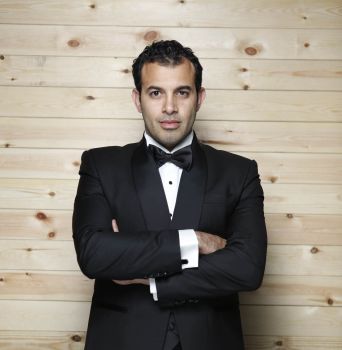The power of humanitarianism
by Weekes, Natalie

As a boy in Egypt, Jawad Nabulsi (’06) was expelled from three schools.
As an activist/social entrepreneur, he was shot by a police officer in the 2011 Egyptian revolution that ousted Hosni Mubarak. In 2015, he topped Arabian Business magazine’s list of the 100 most powerful Arabs under 40. His non-governmental organization, the Nebny Foundation (Nebny means “we build”), has touched over 100,000 lives, providing education, health care and employment in Cairo’s poorest neighbourhoods.
How did that schoolboy become such a man of influence?
Culture shock
Nabulsi’s journey began with a decision to make a fresh start at a university far from home. A supportive uncle in Montreal, a top university ranking in Maclean’s magazine, and the promise of small classes brought him to Acadia at age 17.
“Acadia changed my life,” says the BBA grad. Initial culture shocks included the move from Cairo to a small town in Nova Scotia. “And I had never lived in a dorm, let alone a mixed dorm with a mixed bathroom. That was a big culture shock.”
Soon after Nabulsi’s arrival at Acadia, world events triggered a turning point in his life. “September 11th happened when I was at Acadia,” he says. “I would go from one class to another because the topic was open, and I was speaking to represent the Muslim perspective. The overwhelming majority of the people who die from this radical ideology are Muslims, and the radicalism doesn’t represent who we are and what our religion stands for. I gave a lecture almost every Friday, and I kept doing that until I graduated.” The experience changed his sense of responsibility, from just career and family to a wider area of influence for change.
Being the first Arab Muslim to run for president of the Acadia Students’ Union expanded his world view even further. He came second by about 100 votes. Besides learning how to campaign for himself, he mingled with politicians campaigning in Canadian elections that were happening at the time. “That was a great experience to see how democracy actually works,” he says. “Seeing how they campaigned and organized had a big impact on me.”
Return to Egypt
At Acadia, Nabulsi’s experience with democracy and exposure to other cultures may have influenced his decision to return to Egypt, he says. But what really clinched it was knowing he could make a greater difference there than in Canada. He could foresee the huge impact of starting a social enterprise back in Egypt.
When he was shot in 2011, he bled for five hours while seeking medical aid, because hospitals and doctors were afraid to treat injured protesters.
That experience sparked the Nebny Foundation, which began as a website and call centre to connect medical volunteers with people who were injured. The site facilitated the medical treatment of more than 2,200 revolutionaries.
Nebny expands
Following the revolution, Nabulsi took an apartment in Cairo’s Manshiyat Naser, one of the poorest areas in the world, and consulted local people on what they needed. He discovered that 70 per cent of schoolchildren could not read or write their names. “Most of these families spend over 60 per cent of their income on their children’s education – they want their kids to learn,” he says. The children, too, wanted to learn, but the teaching was non-existent.
Using a scalable model that could be expanded nationwide, the Nebny Foundation was recognized as a social enterprise and received authorization to give school children an extra two hours of teaching, using specially trained teachers, every day for three-and-a-half months. “We provide them with a meal and have clear benchmarks that test the students on how much they gain,” Nabulsi says.
Although their main focus is education, Nebny supports health care and is involved in job creation, because even children who do well in school will leave to go to work if their parents are unemployed.
Planning the future
Nabulsi, now in California and married, graduated in June 2016 with a Master of Public Administration from Harvard Kennedy School and a Master’s in Management from Stanford Business School.
“Since the revolution, it has been a rollercoaster,” he says. “Now I’m taking stock to see how to invest my time and energy in a way that will impact the most people’s lives.”
Nabulsi would like to see a strong international presence among Acadia students and faculty. “There’s value for people coming from abroad to live in such a small town, but there’s also value for Canadian students to interact with international students,” he says. “We both benefit from each other and the cultural interaction.”
Even though Nabulsi is part of both Harvard and Stanford alumni, meeting Acadia alumni is different, he says. “I feel lucky to have been part of Acadia. When you go to a small school, and it’s a good school, you feel special. You feel a close bond.”
Written by Rachel Cooper (’89)
Originally published in the Bulletin, Fall 2016.
Recent Spotlights
External Relations
15 University Avenue
Wolfville, NS, B4P 2R6, Canada
General Inquiries: 902.585.1459
To make a donation: 902.585.1912
Toll Free in North America:
1.866.ACADIA (1.866.222.3428)
acadia.alumni@acadiau.ca
Charitable Registration #: 106681893 RR0001
